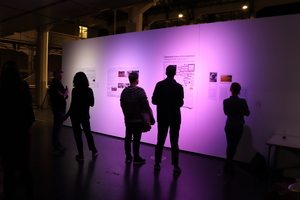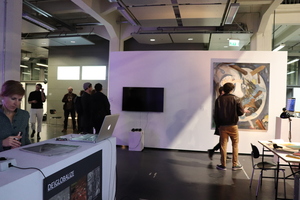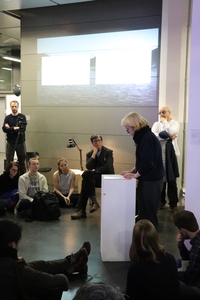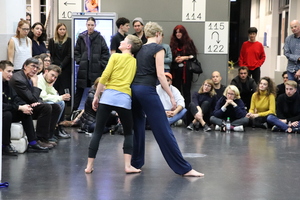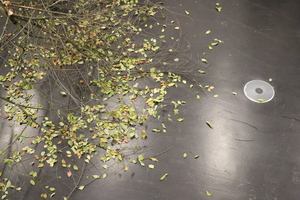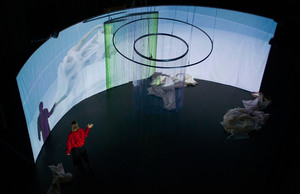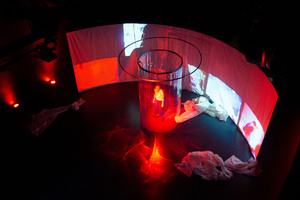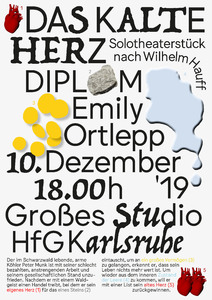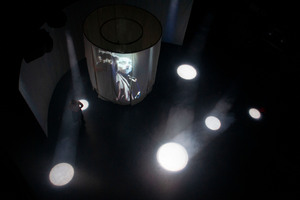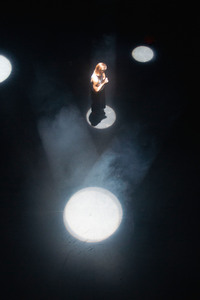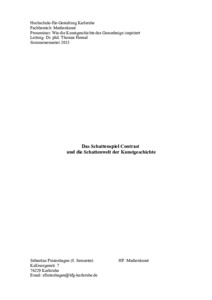Medienobjekt
Alle Inhalte mit Metadaten des Vokabulars "Medienobjekt". Sie sehen nur Inhalte, für die Sie berechtigt sind.
2184 Inhalte
- Seite 1 von 182
Critical Zones
- Titel
- Critical Zones
- Titel (en)
- Critical Zones
- Autor/in
- Beschreibung (de)
- “Critical Zones”: Developing concepts and approaches for grasping the New Climatic Regime (Bruno Latour), that is the transformations in the relations of humans to their “terrestrial” conditions of existence. – The seminar series of Bruno Latour at HfG analyses these transformations as epistemic breaks and shifts of knowledge by drawing an analogy to the scientific revolution in the 17th century, where, after a crisis of former sound knowledge, new epistemic systems, representations and narrations in art, science, and religion had to be constructed and reintegrated into new dispositifs of knowledge. The project tackles an important aesthetic question, which overpasses simple forms of illustration of knowledge: How central is the imaginary capacity of the arts in constructing representations and narrations that are depictions and “generators” of new knowledge systems and therefore vital means of cultural change?
The exhibition at HfG in November will display some preliminary results of the projects developed by the seminar participants. It presents an opportunity to discuss – in a mode of work-in-progress – research questions, aesthetic approaches and epistemic experiments with colleagues and students of HfG and ZKM.
Opening: Nov 7, 19:00; duration: Nov 8, 10:00-19:00, Nov 9, 10:00-15:00
HfG, mittlere Lichtbrücke
- “Critical Zones”: Developing concepts and approaches for grasping the New Climatic Regime (Bruno Latour), that is the transformations in the relations of humans to their “terrestrial” conditions of existence. – The seminar series of Bruno Latour at HfG analyses these transformations as epistemic breaks and shifts of knowledge by drawing an analogy to the scientific revolution in the 17th century, where, after a crisis of former sound knowledge, new epistemic systems, representations and narrations in art, science, and religion had to be constructed and reintegrated into new dispositifs of knowledge. The project tackles an important aesthetic question, which overpasses simple forms of illustration of knowledge: How central is the imaginary capacity of the arts in constructing representations and narrations that are depictions and “generators” of new knowledge systems and therefore vital means of cultural change?
- Beschreibung (en)
- “Critical Zones”: Developing concepts and approaches for grasping the New Climatic Regime (Bruno Latour), that is the transformations in the relations of humans to their “terrestrial” conditions of existence. – The seminar series of Bruno Latour at HfG analyses these transformations as epistemic breaks and shifts of knowledge by drawing an analogy to the scientific revolution in the 17th century, where, after a crisis of former sound knowledge, new epistemic systems, representations and narrations in art, science, and religion had to be constructed and reintegrated into new dispositifs of knowledge. The project tackles an important aesthetic question, which overpasses simple forms of illustration of knowledge: How central is the imaginary capacity of the arts in constructing representations and narrations that are depictions and “generators” of new knowledge systems and therefore vital means of cultural change?
The exhibition at HfG in November will display some preliminary results of the projects developed by the seminar participants. It presents an opportunity to discuss – in a mode of work-in-progress – research questions, aesthetic approaches and epistemic experiments with colleagues and students of HfG and ZKM.
Opening: Nov 7, 19:00; duration: Nov 8, 10:00-19:00, Nov 9, 10:00-15:00
HfG, mittlere Lichtbrücke
- “Critical Zones”: Developing concepts and approaches for grasping the New Climatic Regime (Bruno Latour), that is the transformations in the relations of humans to their “terrestrial” conditions of existence. – The seminar series of Bruno Latour at HfG analyses these transformations as epistemic breaks and shifts of knowledge by drawing an analogy to the scientific revolution in the 17th century, where, after a crisis of former sound knowledge, new epistemic systems, representations and narrations in art, science, and religion had to be constructed and reintegrated into new dispositifs of knowledge. The project tackles an important aesthetic question, which overpasses simple forms of illustration of knowledge: How central is the imaginary capacity of the arts in constructing representations and narrations that are depictions and “generators” of new knowledge systems and therefore vital means of cultural change?
- Typ des Projekts/Werks
- Schlagworte
- Datierung
- 07.11.2018 - 09.11.2018
- Mitwirkende
- Ort: Institution
- Ort
- mittlere Lichtbrücke
- Stadt
- Land
- Beteiligte Institution(en)
- Titel
- Critical Zones
- Titel (en)
- Critical Zones
- Urheberrechtshinweis
- Hochschule für Gestaltung Karlsruhe
- Rechtsschutz/Lizenz
- Freigabe Nutzung HfG
- Projektleiter/in
- Semester
- Importiert am
- 10.01.2019
- Übergeordnete Sets
- 1
Critical Zones
- Titel
- Critical Zones
- Titel (en)
- Critical Zones
- Autor/in
- Beschreibung (de)
- “Critical Zones”: Developing concepts and approaches for grasping the New Climatic Regime (Bruno Latour), that is the transformations in the relations of humans to their “terrestrial” conditions of existence. – The seminar series of Bruno Latour at HfG analyses these transformations as epistemic breaks and shifts of knowledge by drawing an analogy to the scientific revolution in the 17th century, where, after a crisis of former sound knowledge, new epistemic systems, representations and narrations in art, science, and religion had to be constructed and reintegrated into new dispositifs of knowledge. The project tackles an important aesthetic question, which overpasses simple forms of illustration of knowledge: How central is the imaginary capacity of the arts in constructing representations and narrations that are depictions and “generators” of new knowledge systems and therefore vital means of cultural change?
The exhibition at HfG in November will display some preliminary results of the projects developed by the seminar participants. It presents an opportunity to discuss – in a mode of work-in-progress – research questions, aesthetic approaches and epistemic experiments with colleagues and students of HfG and ZKM.
Opening: Nov 7, 19:00; duration: Nov 8, 10:00-19:00, Nov 9, 10:00-15:00
HfG, mittlere Lichtbrücke
- “Critical Zones”: Developing concepts and approaches for grasping the New Climatic Regime (Bruno Latour), that is the transformations in the relations of humans to their “terrestrial” conditions of existence. – The seminar series of Bruno Latour at HfG analyses these transformations as epistemic breaks and shifts of knowledge by drawing an analogy to the scientific revolution in the 17th century, where, after a crisis of former sound knowledge, new epistemic systems, representations and narrations in art, science, and religion had to be constructed and reintegrated into new dispositifs of knowledge. The project tackles an important aesthetic question, which overpasses simple forms of illustration of knowledge: How central is the imaginary capacity of the arts in constructing representations and narrations that are depictions and “generators” of new knowledge systems and therefore vital means of cultural change?
- Beschreibung (en)
- “Critical Zones”: Developing concepts and approaches for grasping the New Climatic Regime (Bruno Latour), that is the transformations in the relations of humans to their “terrestrial” conditions of existence. – The seminar series of Bruno Latour at HfG analyses these transformations as epistemic breaks and shifts of knowledge by drawing an analogy to the scientific revolution in the 17th century, where, after a crisis of former sound knowledge, new epistemic systems, representations and narrations in art, science, and religion had to be constructed and reintegrated into new dispositifs of knowledge. The project tackles an important aesthetic question, which overpasses simple forms of illustration of knowledge: How central is the imaginary capacity of the arts in constructing representations and narrations that are depictions and “generators” of new knowledge systems and therefore vital means of cultural change?
The exhibition at HfG in November will display some preliminary results of the projects developed by the seminar participants. It presents an opportunity to discuss – in a mode of work-in-progress – research questions, aesthetic approaches and epistemic experiments with colleagues and students of HfG and ZKM.
Opening: Nov 7, 19:00; duration: Nov 8, 10:00-19:00, Nov 9, 10:00-15:00
HfG, mittlere Lichtbrücke
- “Critical Zones”: Developing concepts and approaches for grasping the New Climatic Regime (Bruno Latour), that is the transformations in the relations of humans to their “terrestrial” conditions of existence. – The seminar series of Bruno Latour at HfG analyses these transformations as epistemic breaks and shifts of knowledge by drawing an analogy to the scientific revolution in the 17th century, where, after a crisis of former sound knowledge, new epistemic systems, representations and narrations in art, science, and religion had to be constructed and reintegrated into new dispositifs of knowledge. The project tackles an important aesthetic question, which overpasses simple forms of illustration of knowledge: How central is the imaginary capacity of the arts in constructing representations and narrations that are depictions and “generators” of new knowledge systems and therefore vital means of cultural change?
- Typ des Projekts/Werks
- Schlagworte
- Datierung
- 07.11.2018 - 09.11.2018
- Mitwirkende
- Ort: Institution
- Ort
- mittlere Lichtbrücke
- Stadt
- Land
- Beteiligte Institution(en)
- Titel
- Critical Zones
- Titel (en)
- Critical Zones
- Urheberrechtshinweis
- Hochschule für Gestaltung Karlsruhe
- Rechtsschutz/Lizenz
- Freigabe Nutzung HfG
- Projektleiter/in
- Semester
- Importiert am
- 10.01.2019
- Übergeordnete Sets
- 1
Critical Zones
- Titel
- Critical Zones
- Titel (en)
- Critical Zones
- Autor/in
- Beschreibung (de)
- “Critical Zones”: Developing concepts and approaches for grasping the New Climatic Regime (Bruno Latour), that is the transformations in the relations of humans to their “terrestrial” conditions of existence. – The seminar series of Bruno Latour at HfG analyses these transformations as epistemic breaks and shifts of knowledge by drawing an analogy to the scientific revolution in the 17th century, where, after a crisis of former sound knowledge, new epistemic systems, representations and narrations in art, science, and religion had to be constructed and reintegrated into new dispositifs of knowledge. The project tackles an important aesthetic question, which overpasses simple forms of illustration of knowledge: How central is the imaginary capacity of the arts in constructing representations and narrations that are depictions and “generators” of new knowledge systems and therefore vital means of cultural change?
The exhibition at HfG in November will display some preliminary results of the projects developed by the seminar participants. It presents an opportunity to discuss – in a mode of work-in-progress – research questions, aesthetic approaches and epistemic experiments with colleagues and students of HfG and ZKM.
Opening: Nov 7, 19:00; duration: Nov 8, 10:00-19:00, Nov 9, 10:00-15:00
HfG, mittlere Lichtbrücke
- “Critical Zones”: Developing concepts and approaches for grasping the New Climatic Regime (Bruno Latour), that is the transformations in the relations of humans to their “terrestrial” conditions of existence. – The seminar series of Bruno Latour at HfG analyses these transformations as epistemic breaks and shifts of knowledge by drawing an analogy to the scientific revolution in the 17th century, where, after a crisis of former sound knowledge, new epistemic systems, representations and narrations in art, science, and religion had to be constructed and reintegrated into new dispositifs of knowledge. The project tackles an important aesthetic question, which overpasses simple forms of illustration of knowledge: How central is the imaginary capacity of the arts in constructing representations and narrations that are depictions and “generators” of new knowledge systems and therefore vital means of cultural change?
- Beschreibung (en)
- “Critical Zones”: Developing concepts and approaches for grasping the New Climatic Regime (Bruno Latour), that is the transformations in the relations of humans to their “terrestrial” conditions of existence. – The seminar series of Bruno Latour at HfG analyses these transformations as epistemic breaks and shifts of knowledge by drawing an analogy to the scientific revolution in the 17th century, where, after a crisis of former sound knowledge, new epistemic systems, representations and narrations in art, science, and religion had to be constructed and reintegrated into new dispositifs of knowledge. The project tackles an important aesthetic question, which overpasses simple forms of illustration of knowledge: How central is the imaginary capacity of the arts in constructing representations and narrations that are depictions and “generators” of new knowledge systems and therefore vital means of cultural change?
The exhibition at HfG in November will display some preliminary results of the projects developed by the seminar participants. It presents an opportunity to discuss – in a mode of work-in-progress – research questions, aesthetic approaches and epistemic experiments with colleagues and students of HfG and ZKM.
Opening: Nov 7, 19:00; duration: Nov 8, 10:00-19:00, Nov 9, 10:00-15:00
HfG, mittlere Lichtbrücke
- “Critical Zones”: Developing concepts and approaches for grasping the New Climatic Regime (Bruno Latour), that is the transformations in the relations of humans to their “terrestrial” conditions of existence. – The seminar series of Bruno Latour at HfG analyses these transformations as epistemic breaks and shifts of knowledge by drawing an analogy to the scientific revolution in the 17th century, where, after a crisis of former sound knowledge, new epistemic systems, representations and narrations in art, science, and religion had to be constructed and reintegrated into new dispositifs of knowledge. The project tackles an important aesthetic question, which overpasses simple forms of illustration of knowledge: How central is the imaginary capacity of the arts in constructing representations and narrations that are depictions and “generators” of new knowledge systems and therefore vital means of cultural change?
- Typ des Projekts/Werks
- Schlagworte
- Datierung
- 07.11.2018 - 09.11.2018
- Mitwirkende
- Ort: Institution
- Ort
- mittlere Lichtbrücke
- Stadt
- Land
- Beteiligte Institution(en)
- Titel
- Critical Zones
- Titel (en)
- Critical Zones
- Urheberrechtshinweis
- Hochschule für Gestaltung Karlsruhe
- Rechtsschutz/Lizenz
- Freigabe Nutzung HfG
- Projektleiter/in
- Semester
- Importiert am
- 10.01.2019
- Übergeordnete Sets
- 1
Critical Zones
- Titel
- Critical Zones
- Titel (en)
- Critical Zones
- Autor/in
- Beschreibung (de)
- “Critical Zones”: Developing concepts and approaches for grasping the New Climatic Regime (Bruno Latour), that is the transformations in the relations of humans to their “terrestrial” conditions of existence. – The seminar series of Bruno Latour at HfG analyses these transformations as epistemic breaks and shifts of knowledge by drawing an analogy to the scientific revolution in the 17th century, where, after a crisis of former sound knowledge, new epistemic systems, representations and narrations in art, science, and religion had to be constructed and reintegrated into new dispositifs of knowledge. The project tackles an important aesthetic question, which overpasses simple forms of illustration of knowledge: How central is the imaginary capacity of the arts in constructing representations and narrations that are depictions and “generators” of new knowledge systems and therefore vital means of cultural change?
The exhibition at HfG in November will display some preliminary results of the projects developed by the seminar participants. It presents an opportunity to discuss – in a mode of work-in-progress – research questions, aesthetic approaches and epistemic experiments with colleagues and students of HfG and ZKM.
Opening: Nov 7, 19:00; duration: Nov 8, 10:00-19:00, Nov 9, 10:00-15:00
HfG, mittlere Lichtbrücke
- “Critical Zones”: Developing concepts and approaches for grasping the New Climatic Regime (Bruno Latour), that is the transformations in the relations of humans to their “terrestrial” conditions of existence. – The seminar series of Bruno Latour at HfG analyses these transformations as epistemic breaks and shifts of knowledge by drawing an analogy to the scientific revolution in the 17th century, where, after a crisis of former sound knowledge, new epistemic systems, representations and narrations in art, science, and religion had to be constructed and reintegrated into new dispositifs of knowledge. The project tackles an important aesthetic question, which overpasses simple forms of illustration of knowledge: How central is the imaginary capacity of the arts in constructing representations and narrations that are depictions and “generators” of new knowledge systems and therefore vital means of cultural change?
- Beschreibung (en)
- “Critical Zones”: Developing concepts and approaches for grasping the New Climatic Regime (Bruno Latour), that is the transformations in the relations of humans to their “terrestrial” conditions of existence. – The seminar series of Bruno Latour at HfG analyses these transformations as epistemic breaks and shifts of knowledge by drawing an analogy to the scientific revolution in the 17th century, where, after a crisis of former sound knowledge, new epistemic systems, representations and narrations in art, science, and religion had to be constructed and reintegrated into new dispositifs of knowledge. The project tackles an important aesthetic question, which overpasses simple forms of illustration of knowledge: How central is the imaginary capacity of the arts in constructing representations and narrations that are depictions and “generators” of new knowledge systems and therefore vital means of cultural change?
The exhibition at HfG in November will display some preliminary results of the projects developed by the seminar participants. It presents an opportunity to discuss – in a mode of work-in-progress – research questions, aesthetic approaches and epistemic experiments with colleagues and students of HfG and ZKM.
Opening: Nov 7, 19:00; duration: Nov 8, 10:00-19:00, Nov 9, 10:00-15:00
HfG, mittlere Lichtbrücke
- “Critical Zones”: Developing concepts and approaches for grasping the New Climatic Regime (Bruno Latour), that is the transformations in the relations of humans to their “terrestrial” conditions of existence. – The seminar series of Bruno Latour at HfG analyses these transformations as epistemic breaks and shifts of knowledge by drawing an analogy to the scientific revolution in the 17th century, where, after a crisis of former sound knowledge, new epistemic systems, representations and narrations in art, science, and religion had to be constructed and reintegrated into new dispositifs of knowledge. The project tackles an important aesthetic question, which overpasses simple forms of illustration of knowledge: How central is the imaginary capacity of the arts in constructing representations and narrations that are depictions and “generators” of new knowledge systems and therefore vital means of cultural change?
- Typ des Projekts/Werks
- Schlagworte
- Datierung
- 07.11.2018 - 09.11.2018
- Mitwirkende
- Ort: Institution
- Ort
- mittlere Lichtbrücke
- Stadt
- Land
- Beteiligte Institution(en)
- Titel
- Critical Zones
- Titel (en)
- Critical Zones
- Urheberrechtshinweis
- Hochschule für Gestaltung Karlsruhe
- Rechtsschutz/Lizenz
- Freigabe Nutzung HfG
- Projektleiter/in
- Semester
- Importiert am
- 10.01.2019
- Übergeordnete Sets
- 1
Critical Zones
- Titel
- Critical Zones
- Titel (en)
- Critical Zones
- Autor/in
- Beschreibung (de)
- “Critical Zones”: Developing concepts and approaches for grasping the New Climatic Regime (Bruno Latour), that is the transformations in the relations of humans to their “terrestrial” conditions of existence. – The seminar series of Bruno Latour at HfG analyses these transformations as epistemic breaks and shifts of knowledge by drawing an analogy to the scientific revolution in the 17th century, where, after a crisis of former sound knowledge, new epistemic systems, representations and narrations in art, science, and religion had to be constructed and reintegrated into new dispositifs of knowledge. The project tackles an important aesthetic question, which overpasses simple forms of illustration of knowledge: How central is the imaginary capacity of the arts in constructing representations and narrations that are depictions and “generators” of new knowledge systems and therefore vital means of cultural change?
The exhibition at HfG in November will display some preliminary results of the projects developed by the seminar participants. It presents an opportunity to discuss – in a mode of work-in-progress – research questions, aesthetic approaches and epistemic experiments with colleagues and students of HfG and ZKM.
Opening: Nov 7, 19:00; duration: Nov 8, 10:00-19:00, Nov 9, 10:00-15:00
HfG, mittlere Lichtbrücke
- “Critical Zones”: Developing concepts and approaches for grasping the New Climatic Regime (Bruno Latour), that is the transformations in the relations of humans to their “terrestrial” conditions of existence. – The seminar series of Bruno Latour at HfG analyses these transformations as epistemic breaks and shifts of knowledge by drawing an analogy to the scientific revolution in the 17th century, where, after a crisis of former sound knowledge, new epistemic systems, representations and narrations in art, science, and religion had to be constructed and reintegrated into new dispositifs of knowledge. The project tackles an important aesthetic question, which overpasses simple forms of illustration of knowledge: How central is the imaginary capacity of the arts in constructing representations and narrations that are depictions and “generators” of new knowledge systems and therefore vital means of cultural change?
- Beschreibung (en)
- “Critical Zones”: Developing concepts and approaches for grasping the New Climatic Regime (Bruno Latour), that is the transformations in the relations of humans to their “terrestrial” conditions of existence. – The seminar series of Bruno Latour at HfG analyses these transformations as epistemic breaks and shifts of knowledge by drawing an analogy to the scientific revolution in the 17th century, where, after a crisis of former sound knowledge, new epistemic systems, representations and narrations in art, science, and religion had to be constructed and reintegrated into new dispositifs of knowledge. The project tackles an important aesthetic question, which overpasses simple forms of illustration of knowledge: How central is the imaginary capacity of the arts in constructing representations and narrations that are depictions and “generators” of new knowledge systems and therefore vital means of cultural change?
The exhibition at HfG in November will display some preliminary results of the projects developed by the seminar participants. It presents an opportunity to discuss – in a mode of work-in-progress – research questions, aesthetic approaches and epistemic experiments with colleagues and students of HfG and ZKM.
Opening: Nov 7, 19:00; duration: Nov 8, 10:00-19:00, Nov 9, 10:00-15:00
HfG, mittlere Lichtbrücke
- “Critical Zones”: Developing concepts and approaches for grasping the New Climatic Regime (Bruno Latour), that is the transformations in the relations of humans to their “terrestrial” conditions of existence. – The seminar series of Bruno Latour at HfG analyses these transformations as epistemic breaks and shifts of knowledge by drawing an analogy to the scientific revolution in the 17th century, where, after a crisis of former sound knowledge, new epistemic systems, representations and narrations in art, science, and religion had to be constructed and reintegrated into new dispositifs of knowledge. The project tackles an important aesthetic question, which overpasses simple forms of illustration of knowledge: How central is the imaginary capacity of the arts in constructing representations and narrations that are depictions and “generators” of new knowledge systems and therefore vital means of cultural change?
- Typ des Projekts/Werks
- Schlagworte
- Datierung
- 07.11.2018 - 09.11.2018
- Mitwirkende
- Ort: Institution
- Ort
- mittlere Lichtbrücke
- Stadt
- Land
- Beteiligte Institution(en)
- Titel
- Critical Zones
- Titel (en)
- Critical Zones
- Urheberrechtshinweis
- Hochschule für Gestaltung Karlsruhe
- Rechtsschutz/Lizenz
- Freigabe Nutzung HfG
- Projektleiter/in
- Semester
- Importiert am
- 10.01.2019
- Übergeordnete Sets
- 1
Das kalte Herz
- Titel
- Das kalte Herz
- Autor/in
- Kategorie
- Typ des Projekts/Werks
- Schlagworte
- Datierung
- 10.12.2019
- Ort: Institution
- Ort
- Großes Studio
- Stadt
- Land
- Titel
- Das kalte Herz
- Urheberrechtshinweis
- © Emily Ortlepp
- Rechtsschutz/Lizenz
- Freigabe Nutzung HfG
- Beziehung/Funktion
- Semester
- Studiengang
- Typ der Abschlussarbeit
- Importiert am
- 19.06.2024
- Übergeordnete Sets
- 1
Das kalte Herz
- Titel
- Das kalte Herz
- Autor/in
- Kategorie
- Typ des Projekts/Werks
- Schlagworte
- Datierung
- 10.12.2019
- Ort: Institution
- Ort
- Großes Studio
- Stadt
- Land
- Titel
- Das kalte Herz
- Urheberrechtshinweis
- © Emily Ortlepp
- Rechtsschutz/Lizenz
- Freigabe Nutzung HfG
- Beziehung/Funktion
- Semester
- Studiengang
- Typ der Abschlussarbeit
- Importiert am
- 19.06.2024
- Übergeordnete Sets
- 1
Das kalte Herz
- Titel
- Das kalte Herz
- Autor/in
- Kategorie
- Typ des Projekts/Werks
- Schlagworte
- Datierung
- 10.12.2019
- Ort: Institution
- Ort
- Großes Studio
- Stadt
- Land
- Titel
- Das kalte Herz
- Urheberrechtshinweis
- © Emily Ortlepp
- Rechtsschutz/Lizenz
- Freigabe Nutzung HfG
- Beziehung/Funktion
- Semester
- Studiengang
- Typ der Abschlussarbeit
- Importiert am
- 19.06.2024
- Übergeordnete Sets
- 1
Das kalte Herz
- Titel
- Das kalte Herz
- Autor/in
- Kategorie
- Typ des Projekts/Werks
- Schlagworte
- Datierung
- 10.12.2019
- Ort: Institution
- Ort
- Großes Studio
- Stadt
- Land
- Titel
- Das kalte Herz
- Urheberrechtshinweis
- © Emily Ortlepp
- Rechtsschutz/Lizenz
- Freigabe Nutzung HfG
- Beziehung/Funktion
- Semester
- Studiengang
- Typ der Abschlussarbeit
- Importiert am
- 19.06.2024
- Übergeordnete Sets
- 1
Das kalte Herz
- Titel
- Das kalte Herz
- Autor/in
- Kategorie
- Typ des Projekts/Werks
- Schlagworte
- Datierung
- 10.12.2019
- Ort: Institution
- Ort
- Großes Studio
- Stadt
- Land
- Titel
- Das kalte Herz
- Urheberrechtshinweis
- © Emily Ortlepp
- Rechtsschutz/Lizenz
- Freigabe Nutzung HfG
- Beziehung/Funktion
- Semester
- Studiengang
- Typ der Abschlussarbeit
- Importiert am
- 19.06.2024
- Übergeordnete Sets
- 1
Das mediale Ich der Sitte
- Titel
- Das mediale Ich der Sitte
- Beschreibung (de)
- Ein kleiner Fernseher öffnet seine Augen und findet sich unter weiteren Fernsehern wieder. Ihm gegenüber steht ein großer Bildschirm, welcher über die Fernseher zu wachen scheint.
Mit einem freundlichen Grinsen begrüßt der kleine Fernseher diesen Bildschirm, wird aber in seinem Verhalten zurechtgewiesen.
Durch passiv aktives Verhalten dieses Bildschirms und der anderen Fernseher entsteht eine bedrohliche Wirkung. Der kleine Fernseher flieht und findet sich in einer neuen Landschaft wieder, in welcher Blumen erblühen.
In den letzten Sekunden dieses Films offenbart sich auch hier die Präsenz des großen Bildschirms. Diese Arbeit beschäftigt sich damit, inwiefern die Sitte unserer Gesellschaft durch die Medien definiert wird und die Existenz eines Individuums in unserer Welt durch aktiv-passives Verhalten (nicht) zulässt.
Dabei handelt es sich um die audiovisuelle Darstellung der subjektiven Wahrnehmung des Künstlers.
- Ein kleiner Fernseher öffnet seine Augen und findet sich unter weiteren Fernsehern wieder. Ihm gegenüber steht ein großer Bildschirm, welcher über die Fernseher zu wachen scheint.
- Typ des Projekts/Werks
- Titel
- Das mediale Ich der Sitte
- Urheberrechtshinweis
- Sebastian Finzenhagen
- Medienersteller/in
- Importiert am
- 19.12.2018
- Übergeordnete Sets
- 3
Das Schattenspiel Contrast und die Schattenwelt der Kunstgeschichte
- Titel
- Das Schattenspiel Contrast und die Schattenwelt der Kunstgeschichte
- Beschreibung (de)
- In meiner Arbeit über das Thema Das Schattenspiel Contrast und die Schattenwelt der Kunstgeschichte möchte ich mich mit der Welt der Schatten beschäftigen, sowohl auf analoger, kunsthistorischer Ebene, als auch im digitalen Bereich der Computerspiele.
Hierbei werde ich mich auf unterschiedliche, kunsthistorische Beispiele beziehen, bei welchen die Schatten verschiedene Rollen und Fähigkeiten zugesprochen bekommen. Als Hauptquelle hierfür benutze ich die Arbeit von Victor Ieronim Stoichita, Eine kurze Geschichte des Schatten.
So werden wir unter anderem die Entstehung der Malerei anhand der Dibutades Geschichte und der Silhouettenmalerei betrachten, uns Leonardo da Vincis Erkenntnisse zum Verhalten der Schatten und dessen Definition genauer anschauen, auf religiöse Erzählungen von übernatürlichen Ereignissen und auf Schattengeschichten eingehen, welche durch Schatten dargestellt sind. Auch werden wir den Bereich des hermeneutischen Verfahrens anhand des Schattenrisses des Apoll von Belvedere betreten, das Höhlengleichnis von Platon und auch künstlerische Arbeiten aus der Neuzeit in Augenschein nehmen.
Im digitalen Bereich wird uns das Computerspiel Contrast als Anschauungsmaterial dienen, welches von dem Unternehmen Compulsion Games entwickelt und 2013 veröffentlicht wurde.
Ich werde versuchen herauszuarbeiten, inwiefern sich die künstlerischen Arbeiten auf das Spiel Contrast auswirken und dieses womöglich selbst als Kunstwerk betrachtet werden kann.
Hierbei werde ich die zuvor genannten künstlerischen Werke in unterschiedlich kategorischen Kapiteln durchgehen und abschließend solch eines Kapitels das Computerspiel Contrast unter den jeweiligen Gesichtspunkten betrachten.
- In meiner Arbeit über das Thema Das Schattenspiel Contrast und die Schattenwelt der Kunstgeschichte möchte ich mich mit der Welt der Schatten beschäftigen, sowohl auf analoger, kunsthistorischer Ebene, als auch im digitalen Bereich der Computerspiele.
- Titel
- Das Schattenspiel Contrast und die Schattenwelt der Kunstgeschichte
- Urheberrechtshinweis
- Sebastian Finzenhagen
- Importiert am
- 19.12.2018
- Übergeordnete Sets
- 2
